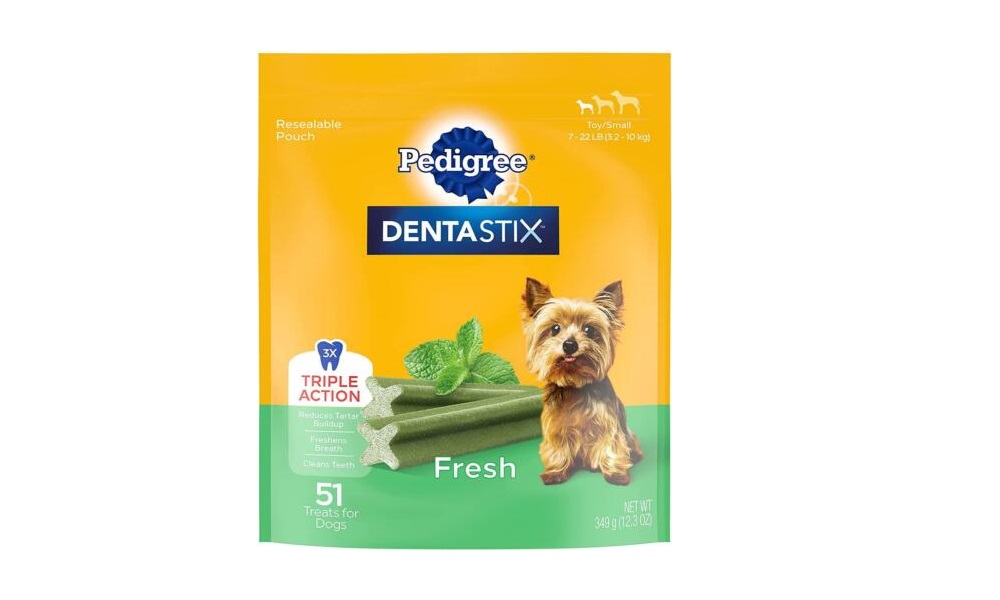Dentastix are generally safe for dogs when used as directed. They help clean teeth and freshen breath. Dentastix are popular dental treats designed to promote oral health in dogs.
These chews can help reduce plaque and tartar buildup, contributing to better dental hygiene. They are often recommended by veterinarians for their effectiveness in maintaining oral health.
Always supervise your dog while they’re chewing Dentastix to prevent choking. Ensure you choose the right size for your dog’s breed and weight.
Regular use can lead to noticeable improvements in your dog’s dental health. While most dogs tolerate them well, monitor for any signs of allergies or digestive issues.

Ingredients In Dentastix
Dentastix are popular dog treats claimed to help with dental hygiene. Understanding the ingredients in Dentastix can help you make informed choices for your pet’s health.
Common Ingredients
Dentastix contain a mix of different ingredients. These ingredients are meant to improve dental health. Here are some of the common ingredients found in Dentastix:
- Rice flour – A primary ingredient that gives texture.
- Wheat starch – Helps in binding the treat together.
- Glycerin – Adds moisture to keep the treat soft.
- Gelatin – Provides a chewy texture.
- Sodium tripolyphosphate – Helps in reducing tartar buildup.
The combination of these ingredients aims to make the treat effective. They also make it palatable for dogs. Dogs love the taste, making it easier for owners to use Dentastix regularly.
Potential Harmful Ingredients
Some ingredients in Dentastix may raise concerns for dog owners. It’s essential to be aware of these potential harmful ingredients:
- Sorbitol – A sugar alcohol that can cause digestive issues.
- Artificial colors – These can be harmful in large amounts.
- Preservatives – Chemicals like BHA and BHT can have negative effects.
- Salt – High salt content is not suitable for dogs.
While these ingredients are approved for use in pet food, they may not be ideal for all dogs. Dogs with sensitive stomachs or allergies might react negatively to these components.
Effects On Dog’s Dental Health
These popular dental treats claim to help with dog’s dental health. But it’s important to know the full story before giving them to your pet. Let’s look at the effects on dog’s dental health.
Impact On Plaque And Tartar
Dentastix are designed to reduce plaque and tartar on your dog’s teeth. These treats have a special texture that helps clean teeth as your dog chews.
The chewing action can scrape off some of the build-up. This can lead to cleaner teeth and fresher breath. Studies show that Dentastix can help reduce plaque by up to 60%. They can also reduce tartar build-up by 80%.
Here is a breakdown:
| Benefit | Percentage Reduction |
|---|---|
| Plaque | 60% |
| Tartar | 80% |
Keep in mind that Dentastix alone are not a complete solution. Regular brushing and vet check-ups are still necessary. It’s also important to choose the right size Dentastix for your dog. Using the wrong size can affect their effectiveness.
Potential Risks
Though Dentastix can be helpful, they come with some risks. Some dogs may experience digestive issues after eating these treats. This can include upset stomach, diarrhea, or vomiting.
If your dog has a sensitive stomach, it’s best to be cautious. Another concern is the calorie content of Dentastix. These treats can add extra calories to your dog’s diet.
Overfeeding can lead to weight gain and other health issues. It’s important to follow the feeding guidelines on the package. Always consider your dog’s overall diet and activity level.
Some Dentastix contain artificial ingredients and preservatives. These can be harmful to some dogs, especially those with allergies.
Always check the ingredient list before giving any new treat to your dog. If you notice any adverse reactions, stop use immediately and consult your vet.
Nutritional Value Of Dentastix
Dentastix are popular dental treats for dogs. They claim to improve dental health. But are they really good for your dog? Let’s explore the nutritional value of Dentastix.
Caloric Content
Dentastix are meant to be a treat. But it’s important to know their caloric content. Dogs need a balanced diet. Too many calories can lead to obesity.
Each Dentastix contains about 53 calories. This might not seem like a lot. But if given daily, it adds up. Here are some key points:
- Each Dentastix has 53 calories.
- Small dogs need fewer calories. So, treats should be limited.
- Large dogs can handle more, but moderation is key.
It’s important to adjust your dog’s main meals. This ensures they don’t consume too many calories. Overweight dogs face many health risks. So, always keep an eye on their total calorie intake.
Nutritional Benefits And Drawbacks
Dentastix offer some benefits. They help clean your dog’s teeth. This reduces plaque and tartar buildup. Clean teeth mean fresher breath. This is a plus for both dogs and owners.
They also contain some vitamins and minerals. But there are drawbacks too. Dentastix are not a substitute for regular dental care. Brushing your dog’s teeth is still essential.
Some dogs may have allergies to ingredients in Dentastix. This can cause digestive issues. Here’s a quick look at the benefits and drawbacks:
| Benefits | Drawbacks |
|---|---|
| Reduces plaque and tartar | Not a substitute for brushing |
| Freshens breath | Possible allergies |
| Contains some vitamins | May cause digestive issues |
Conclusion
No, Dentastix are not bad for dogs. They are specifically designed to be safe and effective for dogs. Dentastix have been clinically proven to reduce plaque and tartar buildup on teeth, and they are recommended by vets as a part of an overall dental care routine.